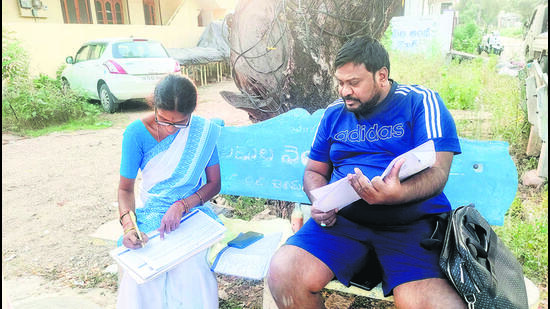Telangana’s caste count creates new conundrum
In Telangana's Mahabubnagar, villagers resist a caste survey, fearing impacts on welfare benefits, sparking political controversy and calls for a second round.
In the sun-baked expanse of Mahabubnagar district in Telangana, November brings a trickle of relief. Morning mist clings to trees and crop fields. By mid-morning, though, the winter whispers retreat before the assertive sun, and the landscape shimmers in heat. It makes N Jogaiah Babu’s morning trudges to the field easier. His village is a jumble of modest single-story houses, their walls a patchwork of limestone wash and broken bricks, lining narrow alleys that wind like dusty ribbons.

An agricultural labourer with a smattering of land holdings, Babu doesn’t walk back from the fields till the sun is searing overhead. But one late November day, the mobile phone in his pocket started buzzing even before noon. It was his wife, telling him that government enumerators were at his mud door, asking questions for what they described as a caste survey. Flustered by the barrage of questions about their annual incomes, bank account details, agricultural land holdings, outstanding loans and personal property, Varalakshmi dialled Babu.
His first response was reticence. Standing in his bunched up soiled dhoti and a shirt, Babu was loathe to part with details about his newly purchased television set and cable connection – made conspicuous by the dish antennas sprouting like metal flowers from his sloping clay-tiled roof – or the smartphone peeking from his breast pocket. “I didn’t understand why he wanted to know all these details. I was not going to part with details that I had not told even my relatives,” Babu said.
The green shoots of prosperity were due to an IT job that his elder son had secured months before, but the 54-year-old didn’t want to invite the wrath of the gods by flaunting his good fortune. There was also a more practical reason. “I wasn’t sure if our welfare benefits and ration cards would get affected. Why should we take any risks, especially when there were no benefits with answering the questions?” he asked.
As the enumerator rattled through his 75-point questionnaire, Babu’s responses grew vaguer and more faint. Tempers flared as the government teacher tried to convince the villager to be more forthcoming in his answers, but in vain. Eventually, the enumerator gave up, withdrawing into the shade of a large tree, shaking his head.
The only question Babu was comfortable with was also the one that the authorities had thought to be the most prickly – that of his caste. “What is there to hide? Everyone knows what caste we are from, what caste my wife is from, and our subcaste too. After all, we live in the same community settlement,” he said.
2
In another part of the arid district, P Murali Krishna’s experience was similar. The mandal education officer of Chinna Chinta Kunta revenue block, Krishna was the supervisor of the survey and coordinated with enumerators. “Our daily routine used to start in the afternoon after half-day school hours, go door-to-door and explain to the households the concept of the survey. Each enumerator covered around 140-160 houses allotted to them,” he said.
But within days of the survey beginning on November 9, 2024, Krishna found wherever the enumerators went, they were stonewalled by respondents. “They would question us why we were asking so many questions, especially with regard to their properties like lands and own houses. We had a tough time,’ he said.
After days of stalled work, Krishna found a work-through. “I told the enumerators not to insist on answers, if the people were not willing. We noted down whatever the people disclosed. But all the respondents disclosed their caste and subcaste without any inhibitions,” he said.
Somewhere between the narratives of Babu and Krishna lies the conundrum of the Telangana caste survey, the results of which were announced earlier this month. Initially billed as a core promise of the Congress that helped end the decade-long rule of the Bharat Rashtra Samithi in December 2023, the survey has now become somewhat of a political albatross around the neck of the administration. Serious questions have been raised by the Opposition about the methodology of the survey and the number of people left out, forcing the government to announce a second round of the exercise that kicked off this week.
What’s troubling for the Congress is that the results have not galvanised the marginalised castes but instead have set off a flood of competing demands, especially because the government chose to release the results alongside the findings of another contentious commission looking into the sub-categorisation of Scheduled Castes. Now, after cascading disputes, the deadline for both exercises have been extended. And the whole imbroglio has underlined the potential pitfalls in the politicisation of the physical counting of castes.
3
The promise of a caste survey in Telangana first surfaced during Rahul Gandhi’s Bharat Jodo Yatra in October 2022, at a time when the Congress felt that the physical counting of castes posed an existential danger to the Bharatiya Janata Party’s rainbow Hindu coalition. Shortly after the Congress swept to power in Telangana in December 2023 – the only province it won in the crucial round of four-state polls – the state government started making preparations to hold the survey. Yet, the Lok Sabha elections and apprehensions within some sections of the party ensured that the survey didn’t kick off until November 9, 2024.
The government enlisted some 87,000-odd enumerators and 8,788 supervisors to go door-to-door, with the data computerised at the district level. The enumerators were provided with a 75-point questionnaire, including 56 primary questions and 16 supplementary questions. The questionnaire, which ran into eight pages, was divided into two parts – personal data and economic data.
Part-1 contained questions about a person’s caste, subcaste, religion, age, gender, mother tongue, mobile numbers, educational qualifications, information regarding disability, profession, whether the person held a salaried job or a farm job or was self-employed, annual income, bank details; details of personal property, including agriculture land, type of land and irrigation facilities, whether the person availed of reservations in the past, which welfare schemes they availed of in the last three years, and the political background and political posts they held.
Part-II comprised queries pertaining to the economic status of people, including their outstanding loans, ownership of any personal property, details of cattle they owned, ration cards, and electricity supply, among others.
Almost immediately, the problems began.
Suryakala, a primary schoolteacher who conducted the survey in the Lalkota village of Mahabubnagar district, said things went smoothly only after she stopped probing when people refused to part with the information such as their Aadhaar card details or land title deeds. “At least three people refused to give any information; they gave bare details like their names and castes, only after our mandal officers convinced them,” she said.
In urban areas, too, the reticence lingered.
Azra Tasmeen, the headmistress of the Government Urdu Primary School at LB Nagar in Hyderabad, said that people were not very enthusiastic about giving information. “One of them rudely shut the door in my face. In most areas, I had a tough time in convincing the people to give information as per the questionnaire. However, poorer people happily shared information, hoping the survey would fetch them benefits,” she said.
Some citizens said they refused to answer the financial section of the questionnaire. “I didn’t like some queries, such as whether I had any pending loans or any properties in my name or my husband’s name. The enumerator also asked me whether the flat I am staying in was rented and whether I was doing any job. I refused to answer these questions. He noted down my caste and left,” said P Pallavi, a resident of Alakapuri Colony of Nagole area in the greater Hyderabad region.
Others said all declarations were taken at face value, without any checks. A Mallesh, a resident of Divitipalli village of Bhoothpur mandal, said the enumerator only asked his caste, names of family members, and number of properties. “Though I have a small house in Jadcherla, I did not disclose it. I only told him that I have a thatched shed on a three-acre land. He did not verify the details,” he said.
4
On February 4, chief minister Revanth Reddy tabled the findings of the survey in the assembly, making Telangana only the second government in independent India – Bihar was the first, in 2023 – to declare the results of a caste count. Karnataka and Andhra Pradesh have also conducted caste surveys but are yet to declare results, with the new government in the latter state set to shelve the report.
Telangana’s survey found that other backward classes (OBCs) accounted for 56.33% of the population, followed by Scheduled Castes at 17.43% and Scheduled Tribes at 10.45%. Other castes made up 15.79% of the population. Muslim constituted about 12.56% of the state’s population, of which OBC Muslims were about 10.08%.
The numbers triggered a storm. The Opposition said the methodology was half-baked and unreliable. Bharat Rashtra Samithi working president KT Rama Rao said there were several errors. “The Congress government presented a half-baked report,” he said. Even some Congress leaders expressed doubts about the OBC numbers. “Compared to the voters list, there is a lot of variation in the OBC population figures. This is done deliberately and is a humiliation to the OBCs,” said Congress lawmaker Chintapandu Naveen Kumar.
This was unprecedented. In Bihar, there was near-unanimity among parties on the survey and the only clamour was over taking credit. Here, Reddy himself appeared unsure about whether the poll promise of 42% quota for OBCs in local bodies could be fulfilled. “The Supreme Court mandates that total reservations should remain within 50%. Any increase beyond 50% requires a Constitutional amendment, which is under the Centre’s jurisdiction, not the state government,” he said.
More chaos ensued. Prominent OBC leaders from the Congress, including Rajya Sabha MP R Krishnaiah and former Telangana OBC commission chairman Vakulabharanam Krishna Mohan Rao, threatened agitation.
There was another problem. A section of the Dalits, especially the Madigas, were up in arms against the recommendations of the subclassification commission, arguing that the quota pie was divided inequitably when compared with population shares in the caste survey and earlier census. “The report lacks scientific basis. As a result, there is a high possibility of injustice in the distribution of reservations to certain communities. We have appealed to the government to rectify the flaws,” said the founder of Madiga Reservation Porata Samithi, Manda Krishna Madiga.
Backed into a corner, the government finally gave in, announcing this week a renewed survey and an extension for the subclassification commission, essentially to tweak its findings. The government said the first round covered about 96.9% of the state’s households but left out about 300,000 households. “Even those who took part in the first round of survey but want to update their information can furnish the same in the second round,” said deputy chief minister Mallu Bhatti Vikramarka.
Two senior functionaries –information and public relations minister Ponguleti Srinivas Reddy and Backward Classes Commission member Tirumalagiri Surender – told HT that the Opposition’s allegations were politically motivated. “There could be some people who might have refused to take part in the survey even for political reasons…but it can be considered a big success,” said Surender.
Vikramarka reiterated the government’s commitment to providing 42% reservation for OBCs but the controversy left a cloud hovering over the exercise.
In Mahabubnagar district, Babu now feels vindicated in his decision to not divulge sensitive details to the enumerator. Nothing has changed in his village in the three months since the surveyors arrived. The winter is receding. The once-sparse trees are now showing the first signs of renewal. The water level has started to drop in the tanks, creating expanding rings of cracked earth around their shrinking edges.
“I thought maybe we would get some benefits that eased our daily burdens. But there is nothing,” Babu lamented. “How long will we wait?”








